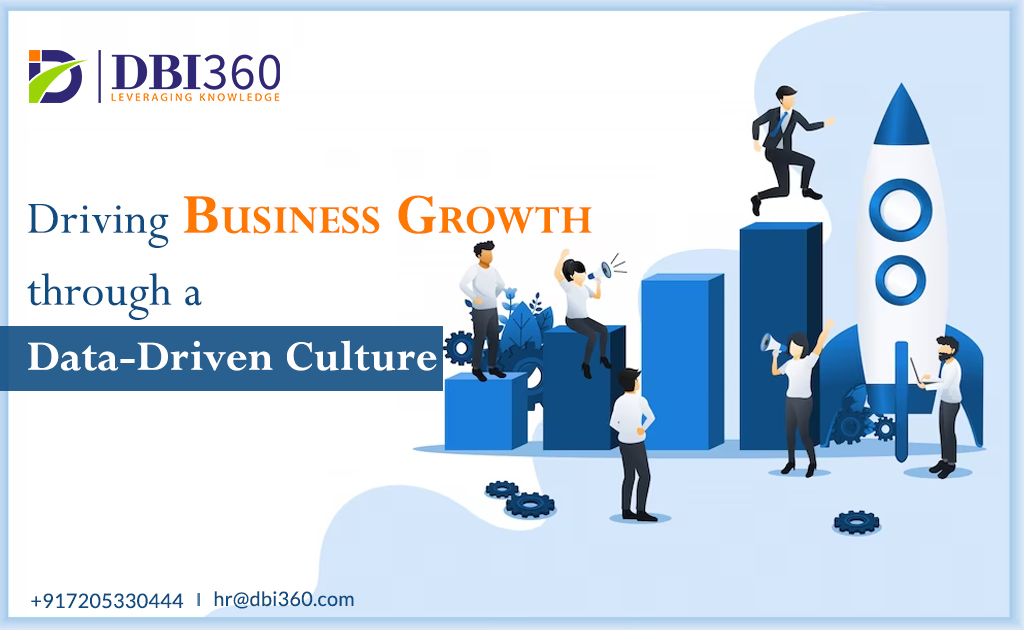In today’s digital age, data has become an asset for businesses. It holds the potential to unlock insights, drive better decision-making, and fuel growth.
But, to harness the full power of data, organizations must build a data-driven culture that empowers employees with access to reliable data. Businesses can unlock many benefits by fostering a culture where data is valued, utilized, and shared.
In this blog, we will explore the significance of building a data-driven culture, the impact of empowering employees with reliable data, and practical strategies to cultivate such a culture within your organization.
Let’s dive into the world of data-driven cultures and discover how they can transform your business.
Importance of a Data-Driven Culture:
A data-driven culture is where data is at the heart of decision-making processes, and employees are encouraged to rely on data to drive their actions.
Here are some key reasons why building a data-driven culture is crucial:
-
Informed Decision-Making: Reliable data provides the foundation for informed decision-making. When employees have access to accurate and up-to-date data, they can make better decisions backed by facts and insights.
-
Performance Improvement: Data-driven decision-making leads to improved performance. By leveraging data to identify patterns, trends, and opportunities, employees can optimize their strategies, processes, and workflows for enhanced efficiency and productivity.
-
Competitive Advantage: Organizations that embrace a data-driven culture gain a competitive edge. Data-driven insights enable businesses to spot emerging trends, identify customer preferences, and adapt their offerings, staying ahead of the competition.
-
Business Growth: A data-driven culture fosters innovation and growth. By empowering employees to explore data, uncover insights, and drive improvements, businesses can innovate new products, services, and business models that resonate with their target market.
Empowering Employees with Reliable Data:
To cultivate a data-driven culture, organizations must empower their employees with access to reliable data.
Here’s how:
-
Establish Data Governance: Put in place a robust data governance framework that ensures data quality, security, and compliance. Define data ownership, access controls, and data management processes to maintain the integrity and reliability of data.
-
Provide Data Literacy Training: Offer training programs to enhance employees’ data skills and knowledge. This includes understanding data analytics, interpreting data visualizations, and using data tools.
-
Foster Collaboration and Communication: Encourage collaboration and communication among teams to share data insights and best practices. Ease cross-functional discussions to foster a culture of data sharing and learning.
-
Invest in Data Infrastructure: Ensure the availability of reliable data infrastructure and tools. This includes robust data storage systems, data integration platforms, and data analytics tools that enable employees to access and analyze data.
-
Promote Data-Driven Mindset: Instill a data-driven mindset throughout the organization by highlighting the value of data and its impact on decision-making. Encourage employees to focus on data when discussing strategies, setting goals, and evaluating performance.
-
Encourage Experimentation: Foster a culture that encourages experimentation and learning from data. Create an environment where employees feel empowered to test hypotheses, analyze results, and iterate based on data insights. Emphasize that failures are opportunities for growth and improvement.
-
Recognize and Reward Data-Driven Behavior: Acknowledge and reward employees who embrace data-driven decision-making. This can be through incentives, recognition programs, or career advancement opportunities. You motivate employees to incorporate data into their daily work by showcasing the importance of data-driven behavior.
Realize the Benefits of a Data-Driven Culture:
Building a data-driven culture empowers employees and unlocks the potential of data within your organization. Here are some key benefits you can expect to see:
-
Improved Decision-Making: With access to reliable data, employees can make informed decisions based on factual insights rather than assumptions or gut feelings. This leads to more accurate and effective decision-making processes.
-
Enhanced Performance: By leveraging data to analyze performance metrics, employees can identify areas for improvement, optimize processes, and achieve better results. Data-driven insights enable teams to focus their efforts on high-impact activities.
-
Agility and Adaptability: A data-driven culture promotes agility and adaptability in response to changing market dynamics. Employees can analyze data, identify emerging trends, and pivot strategies to stay ahead of the competition.
-
Innovation and Growth: Reliable data fuels innovation by providing the foundation for new ideas and initiatives. Through data-driven innovation, employees can uncover market opportunities, develop customer-centric solutions, and drive business growth.
-
Increased Collaboration: When data is accessible and shared across teams, it fosters collaboration and knowledge-sharing. Employees can collaborate on data-driven projects, contribute insights, and solve complex challenges.
Real-Life Examples:
Real-life examples prove the power of building a data-driven culture:
-
Netflix: Netflix leverages data to personalize user experiences and recommend content. By analyzing user viewing patterns and preferences, they provide tailored recommendations that keep subscribers engaged.
-
Amazon: Amazon uses data-driven insights to optimize its supply chain operations. They ensure efficient inventory management, reduce delivery times, and enhance customer satisfaction by analyzing vast amounts of data.
-
Procter & Gamble: Procter & Gamble implemented a data-driven approach to product development. They use consumer insights and market data to identify consumer needs, develop innovative products, and stay competitive in the consumer goods industry.
Conclusion:
Building a data-driven culture is essential for organizations seeking to thrive in the digital era.
By empowering employees with access to reliable data, businesses can make informed decisions, improve performance, and drive innovation. It requires establishing a robust data governance framework, providing data literacy training, fostering collaboration, and promoting a data-driven mindset.
By embracing a data-driven culture, organizations can unlock the full potential of data and gain a competitive advantage in today’s data-driven landscape. Empower your employees with reliable data and pave the way for success in the digital age.

